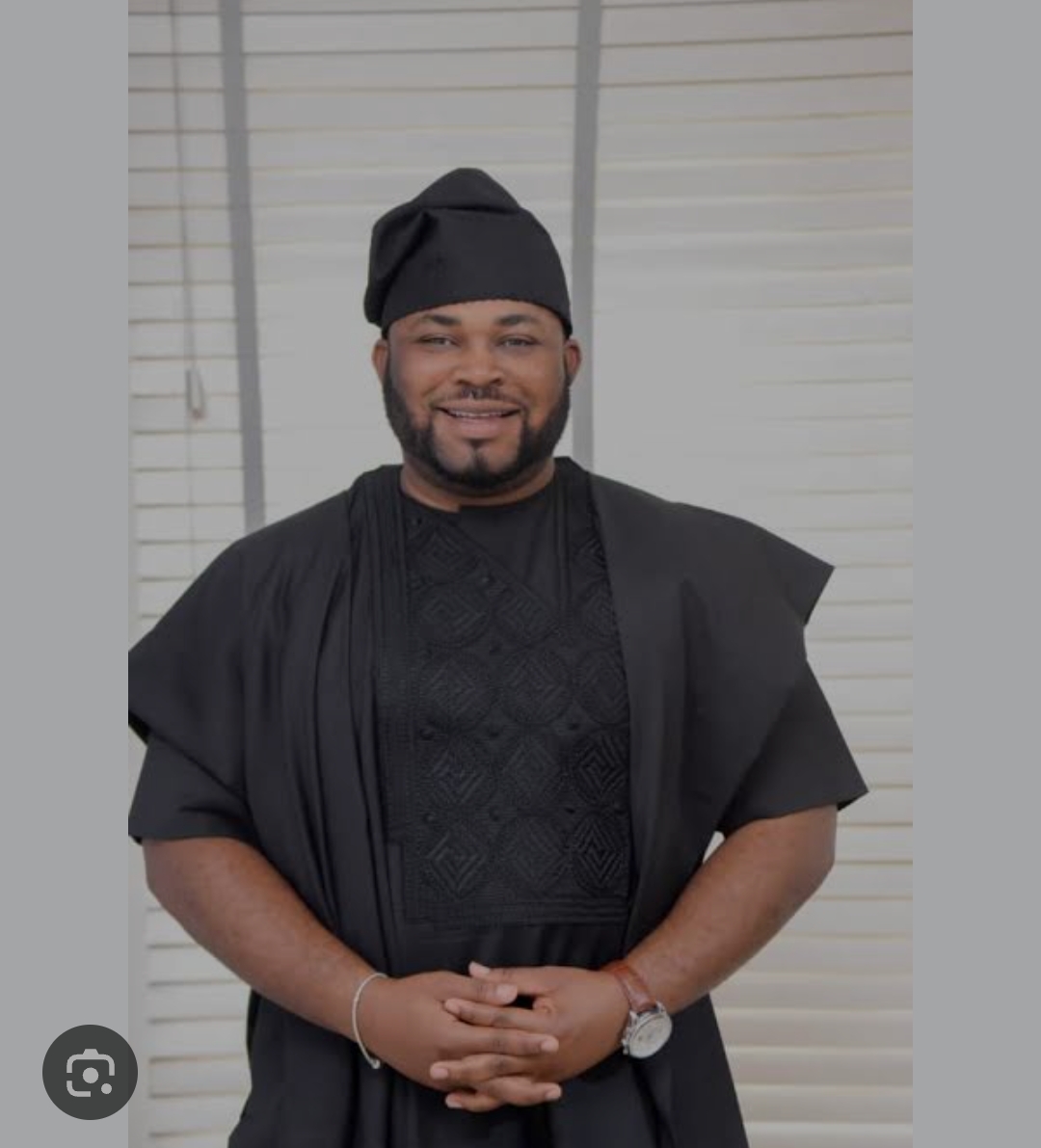celebrity radar - gossips
Beyond The Ayeni Name…Will Adaobi Alagwu Save Her Child From Future Disgrace?

Beyond The Ayeni Name…Will Adaobi Alagwu Save Her Child From Future Disgrace?
– How A Mother’s Greed May Ruin Her Daughter’s Life (Video)
By Ifeanyi Okonkwo
There is a virtue, Adaobi Alagwu probably presumes, in being brazen, thus her inclination to place on parade her infant child, Omarosa’s murky roots. Only a mother afflicted by insolence and lack of shame would soullessly jeopardise her daughter’s self-esteem by forcing the paternity of an unwilling father on her.
In the wake of billionaire magnate, Tunde Ayeni’s decisive rebuttal of Alagwu’s claim that he is the father of her child, more posers have been raised concerning paternity fraud.
A recent post by a social media commentator condemned Ayeni’s bid to stop Alagwu from using his name for her daughter, arguing that he would fail in his bid. He said, “Anybody can bear any name he or she likes, provided you’re not impersonating anyone. A female child cannot be said to be impersonating Mr Ayeni simply by having the same surname with him.” Whilst this position might be convenient for people who might have a jaundiced perspective to the enormity of the implications of such a rejection as AdaObi and her daughter have faced, the question to ask is who in their right senses would keep a name that will be a constant reminder of their mistakes and humiliation. If AdaObi had as much any sense of self-worth would she have insisted on acceptance as she has for her daughter from a man so unwilling and so detesting of her that he’s willing to go to any lengths in proving his disapproval and rejection of them both?
Why is it okay to force an unwilling man to take responsibility for a child that was forced on him when all accountability should be with the 31-year-old single lady who out of greed jeopardized her future to keep an unwanted pregnancy for a married man?
It would be recalled that Tunde Ayeni wrote the Nigerian Immigration Service (NIS), recently, asking it to void any international passport presented by his estranged girlfriend and Abuja lawyer, Adaobi Alagwu and her child, bearing his name.
Declaring any such document illegitimate, Ayeni, speaking through his lawyer, Dele Adesina (SAN) established that Alagwu’s daughter isn’t entitled to the use of his name on her travel document as he has no familial relationship with her.
Ayeni disclosed this by copying the NIS a “Cease and Desist” legal notice he sent to Alagwu entitled, “Withdrawal of Consent for Use of the Family Name ‘Ayeni’ With Respect To Your Daughter Omarosa.”
Ayeni’s recent step was informed by Alagwu’s adoption of his name on her daughter’s international passport even after a DNA test had established that she wasn’t Ayeni’s child. His letter to the NIS follows the recent arrest and detention of Alagwu for trespassing on and breaking into his private property in Abuja.
The duo has been entangled in a battle of wits that has seen Ayeni issue multiple press statements to refute claims of paternity of Alagwu’s child.
In her desperation to get hooked on the billionaire magnate and former bank chief, Alagwu fabricated a plot to get pregnant by him and, so doing, implant herself and her child as beneficiaries of his estate.
Alagwu, a trained attorney, was misled by the belief that she had the upper hand on Ayeni. She thought she had him by the balls.
Like all frantic liars, she thought she had gained a victory over Ayeni simply by claiming that she was pregnant for him and her baby girl belonged to him (but she was mistaken).
Her adoption of his name for her daughter, Omarosa has been dismissed as a last-ditch resort as she struggles to hold on to her ex-billionaire boyfriend who was until recently her benefactor and family’s meal ticket.
To underscore how bad the menace of such desperate girls is, a cursory look at her company website reveals the same address as the one from which she was humiliatingly ejected by Ayeni.
Pundits aver that if she had truly been gainfully employed as she claimed – since she fell out with Ayeni – her company address ought to have changed both online and offline.
Her so-called company website has no meaningful indicator of how business clients could reach her. There are no markers on the website detailing or establishing her presence as the administrator or CEO of a thriving enterprise, contrary to her claims.
What this translates to is that she (Alagwu) has no viable source of livelihood and has always been completely dependent on Ayeni.
Only a woman bereft of self-respect and shame would carry on so, without a care in the world about how badly her lack of a decent livelihood rubs off on her.
As Alagwu deploys every wile and weapon in her arsenal to fight her way into Ayeni’s household, not a few people have advised her to desist from what is a wild goose chase. But she is undeterred.
If she won’t care what becomes of her name, at least she ought to be concerned about the implications of her actions for her innocent daughter, Omarosa.
If anything, Alagwu must be wary of mortgaging her daughter’s interest in her frantic bid to settle scores with her estranged lover, Ayeni. Even if she enjoys the inalienable right to adopt any name of her choice, including Tunde Ayeni’s, for her daughter, the onus rests on her to listen to the voice of reason and embrace moral rectitude by protecting her daughter from certain ignominy and shame of answering to the name of a man who publicly rejected her.
And to those goading her into believing in her lies that he paid her bride price and his wife is the architect of this rejection, it is unimaginable how twisted they are in their thinking. Hanging on to the last straws of desperation, they look away from the obvious display of rejection from Mr Ayeni, a man married for 30 years and experienced in the ways of life enough to convince his wife and friends he will go to any length to erase Adaobis existence.
If it wasn’t his making why didn’t he publish a disclaimer? The man wants Alagwu to feel the full weight of his rejection by placing his wife in front of him and arming her with the authority to denigrate Alagwu and make her face the folly of bringing nothing to the table except a fair complexion in comparison to his established wife.
How does she think her daughter would feel when she grows up and finds out that her mother had forced upon her, the name of a man who went to great measures to denounce her?
It’s about time Alagwu embraced caution and silenced her ego, lest she becomes a sad, cautionary tale. For most of history, one essential, immutable difference between men and women was that men could hide the fact that they had created a child and women could not. Pregnancy and childbirth showed the world who the mother was; paternity could only be assumed.
New parents are often told how much their babies look like the father. The research on whether most do or do not is ambiguous, but the fancy persists, in part because, consciously or unconsciously, people think that emphasising the resemblance will set a man’s mind at ease, thus fortifying the paternal bond.
Fortunately for Ayeni, he refused to be misled by such a wanton appeal to sentimentality. As Nara Milanich, a professor of history at Barnard College, writes in her solidly researched and enlightening new book, “Paternity: The Elusive Quest for the Father” (Harvard), a “common metaphor invoked by nineteenth-century jurists was that Nature had concealed fatherhood by an impenetrable veil.”
Thanks to science, the DNA test to be precise, Tunde Ayeni was able to penetrate that mythical veil to establish the convoluted plots of his estranged girlfriend, Alagwu’s paternity fraud.
Until recently, that veil was often a source of frustration, leading to domestic doubts and irresolvable courtroom conflicts. Literature gives us many a husband driven half-mad by the suspicion that his child is not the fruit of his loins, as is King Leontes, in “The Winter’s Tale,” and women who deceive their husbands on this score, like the wife in Maupassant’s story “Useless Beauty,” who tells her husband that one of their seven children isn’t his, but won’t say which.
Paternal unknowability, however, was also enormously useful. Many legal traditions around the world, including the Anglo-American one, adhered to the marital presumption of legitimacy at least until the twentieth century: a child born to a married woman was considered to be the biological progeny of her husband. (A child born to an unmarried woman was, Milanich writes, “historically deemed a filius nullius, a child of nobody.”) Milanich tells the story of a man named Remo Cipolli, who, in 1945, sued his wife, Quinta Orsini, for adultery, and sought to deny paternity, after she gave birth to an infant who appeared to be black. Cipolli and his wife, who were both white Italians, lived in a small town near Pisa, where several African-American soldiers had been stationed at the end of the Second World War.
The case became notorious—the baby was known as “the little Moor of Pisa.” In the end, although a civil court found Orsini guilty of adultery, it also concluded that her husband, Cipolli, was legally the baby’s father.
Thanks to science, Ayeni would experience no such embarrassment and heartache through paternity fraud.
In all of these, the fate of one human element hangs in the balance, that of Alagwu’s innocent young daughter. And her salvation, interestingly lies in Alagwu’s hands. Will Adaobi Alagwu quit barking up the wrong tree? Will she desist from her wild goose pursuit and so doing save her innocent daughter from immediate and future disgrace?
celebrity radar - gossips
COAS Ties Battlefield Success to Constitutional Allegiance and Civil Authority

COAS Ties Battlefield Success to Constitutional Allegiance and Civil Authority
During his operational visit to the 4 Special Forces Command in Doma, the Chief of Army Staff, Lieutenant General Waidi Shaibu, delivered a stark message, intertwining the elite unit’s combat effectiveness with an unshakeable pledge of allegiance to President Bola Ahmed Tinubu and the Nigerian Constitution.
While directing troops to intensify high-impact operations, the COAS made it clear that their mission is a direct expression of their constitutional oath. He reaffirmed that the Nigerian Army’s primary role is to defend the nation against external aggression and provide aid to civil authority, all in strict adherence to the supreme law of the land and under the leadership of the Commander-in-Chief.
This emphasis on loyalty served as a powerful backdrop to his operational directives. By linking the “decisive defeat” of terrorists to the Army’s constitutional mandate and loyalty to the President, Lt. Gen. Shaibu sought to galvanise the Special Forces, framing their upcoming engagements not just as military objectives but as a sacred duty to the democratically elected government and the nation’s founding charter. The message was clear: their fight is a fight for the Constitution and the president it empowers.
celebrity radar - gossips
Mercy Johnson Okojie, Purity Okojie Lead Campaign for Girls Tag’s All-in-One Period Care Kit

*Mercy Johnson Okojie, Purity Okojie Lead Campaign for Girls Tag’s All-in-One Period Care Kit
iBlend Services, appointed Regional Agency for Girls Tag alongside its PR and marketing firm, Eddie MPR, has officially launched Girls Tag, described as Nigeria’s first all-in-one period care pack designed for girls aged nine and above.
The initiative seeks to tackle persistent gaps in menstrual health education and access to sanitary products in Nigeria, where many girls experience their first period with little preparation or guidance. According to the promoters, Girls Tag was created to eliminate the fear, confusion, and stigma often associated with puberty, replacing them with confidence, comfort, and dignity.
Beyond hygiene, the brand positions itself as a supportive care system for both girls and parents, offering tools and language to guide families through early puberty conversations.
To strengthen its reach, Girls Tag announced a strategic ambassadorial partnership with Nollywood actress and philanthropist Mercy Johnson Okojie and her daughter, Purity Okojie. The mother-daughter collaboration is intended to reflect authenticity and relatability for Nigerian families navigating similar experiences.
Speaking on the partnership, the leadership of iBlend Services expressed confidence that the ambassadors’ real-life connection would resonate deeply with mothers and daughters nationwide.
Mercy Johnson Okojie, in her remarks, described the initiative as a natural fit, noting that puberty can be an anxious period for both parents and children. She also revealed that her newly authored puberty guide, Youberty, will be included in every Girls Tag kit. The book is designed to help boys and girls aged 10 to 13 better understand the physical and emotional changes that come with growing up.
Each Girls Tag care pack contains premium sanitary pads in various sizes, overnight period pants, panty liners, disposable sanitary bags, a discreet sanitary purse, and a copy of Youberty. The kit is tailored to support first-time and early period experiences while promoting proper hygiene and self-care.
The company disclosed that the product will be available nationwide in Q2 2026 at select retail stores, pharmacies, and malls, with direct delivery options through its website and social media handle, @girlstag.ng.
With its combined focus on education, dignity, and accessibility, Girls Tag aims to reshape menstrual health support for young girls across Nigeria.
celebrity radar - gossips
DSS Invites Ogun LG Chairman, Alebiosu and others Over Attack At APC Stakeholders Meeting

*DSS Invites Ogun LG Chairman, Alebiosu and others Over Attack At APC Stakeholders Meeting*
The Department of State Services (DSS) Abeokuta on Monday invited Ijebu Ode local government Chairman, Hon Dare Alebiosu, and some political thugs alleged to have caused disturbance, incitement and physical attack during an APC stakeholders meeting few days to Ward Congress in the area.
A reliable security source disclosed that an aide of the Governor who was reportedly attacked during the stakeholders meeting was said to have petitioned the DSS.
According to the source, there have been growing concerns over the activities of the LG Chairman, who was alleged to be backing cultists and using them as a tool for harassment and intimidation in the community.
As it was reported, the LG boss was accused to have openly confronted and accused the Governor’s aide for identifying some of the cultists to DSS officials, while one of the cultist was said to have hit their target in the face and removing his medicated glasses. The swift and professional intervention of the Men of DSS quickly deescalated the matter and the meeting went on to a conclusive end.
The meeting which held at the residence of Chief Okuboyejo, the Governor’s Advisory Council Chairman at GRA Ijebu ode became tensed, after the LG chairman invaded the private premises of the old man with a large number of cultists which some of them were allegedly believed to be armed.
The source added that the case is presently with the DSS, while the petitioner has also submitted various evidence against the LG Chairman.
In another turn of event, Commisoner for Urban and regional planning was harassed and robbed, so also the former SLG to the Local govt also almost lost his life as he was attacked with cutlass by thugs who were allegedly said to be led by Dapo Adebajo, he was hospitalized. The case has also been reported to the DSS and Police as at the time of filling this report.
-

 celebrity radar - gossips7 months ago
celebrity radar - gossips7 months agoWhy Babangida’s Hilltop Home Became Nigeria’s Political “Mecca”
-

 society6 months ago
society6 months agoReligion: Africa’s Oldest Weapon of Enslavement and the Forgotten Truth
-

 society7 months ago
society7 months agoPower is a Loan, Not a Possession: The Sacred Duty of Planting People
-

 news3 months ago
news3 months agoWHO REALLY OWNS MONIEPOINT? The $290 Million Deal That Sold Nigeria’s Top Fintech to Foreign Interests








